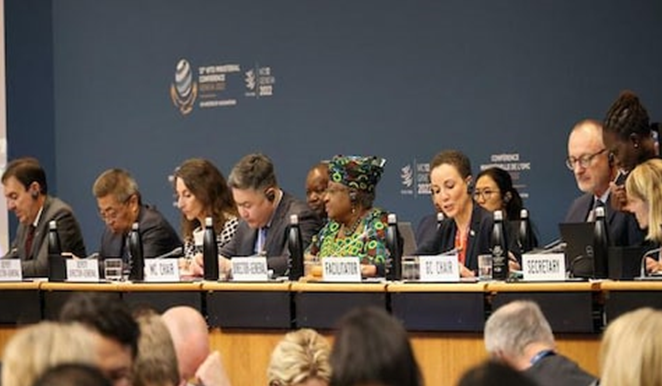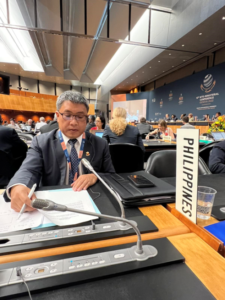
-
Ministers agree to extend moratorium on customs levies on e-commerce transactions until WTO’s next ministerial conference, ordinarily by next December
-
The Philippines backed the extension, citing the need to advance work under the Electronic Commerce Work Programme and highlighting e-commerce’s vital role in the global post-pandemic recovery
-
Major players like US, UK and EU backed the moratorium, arguing that letting the exemption expire will undermine a global recovery threatened by spiralling prices
The World Trade Organization has extended the moratorium on the imposition of customs duties on global electronic transmissions until its next ministerial conference likely to be held in December 2023.
Ministers of the 164 member states of WTO agreed on the extension on Friday, June 17, the final day of the extended 12th WTO Ministerial Conference in Geneva.
“We agree to maintain the current practice of not imposing customs duties on electronic transmissions until MC13, which should ordinarily be held by 31 December 2023,” the agreement showed, referring to the next ministerial conference.
The agreement specified that the moratorium on applying duties to cross-border electronic transmissions would expire in March 2024, should the next conference be postponed.
A day earlier, members provisionally agreed to extend the moratorium, which has exempted data flows from customs tariffs since 1998, had raised major concerns among businesses.
With backing from major players like the United States, the United Kingdom and the European Union, the ministers argued that letting the exemption expire would undermine a global recovery already threatened by spiralling prices.
Philippine stance
Philippine Trade and Industry Assistant Secretary Allan B. Gepty also supported the extension, stressing the need to advance work under the Electronic Commerce Work Programme and highlighting e-commerce’s vital role in the global post-pandemic recovery.

The Philippines co-sponsored the draft ministerial decision seeking to reinvigorate the work program through intensified discussions based on members’ proposals, including those relating to development issues.
Addressing the conference, Gepty emphasized the need to maintain a stable and predictable digital trading environment not only for big businesses, but especially for micro, small and medium enterprises, and women entrepreneurs to boost economic growth.
The ministers agreed to intensify discussions on the moratorium and instruct the General Council to hold periodic reviews based on reports that may be submitted by relevant WTO bodies on the scope, definition, and impact of the moratorium on customs duties on electronic transmissions.
Thursday’s (June 16) provisional deal was reached in a negotiating room of the WTO’s headquarters among a group of major members before it was included in a raft of initiatives approved by the 164 members in a closing session on Friday.
India, Indonesia, Sri Lanka, Pakistan and South Africa had earlier threatened to block the extension, but they later changed their minds.
The Declaration on Global Electronic Commerce was adopted on May 20, 1998 at the second session of the WTO in Geneva as ministers recognized that global e-commerce was growing and creating new opportunities for trade.
The declaration mandated the General Council to establish a comprehensive work program to examine all trade-related issues relating to global e-commerce, taking into account the economic, financial, and development needs of developing countries, and recognizing that work is also being undertaken in other international fora.
“Without prejudice to the outcome of the work program or the rights and obligations of members under the WTO agreements, we also declare that members will continue their current practice of not imposing customs duties on electronic transmissions,” the members declared.
Also at the 12th WTO Ministerial Conference in Geneva on June 17, multilaterally negotiated outcomes on a series of key trade initiatives were reached.
The “Geneva Package” contains a raft of unprecedented decisions that include restrictions on fisheries subsidies and the WTO’s response to emergencies, particularly a partial waiver of intellectual property rights for licensing of COVID-19 vaccines; food security and agriculture, and WTO reform.




